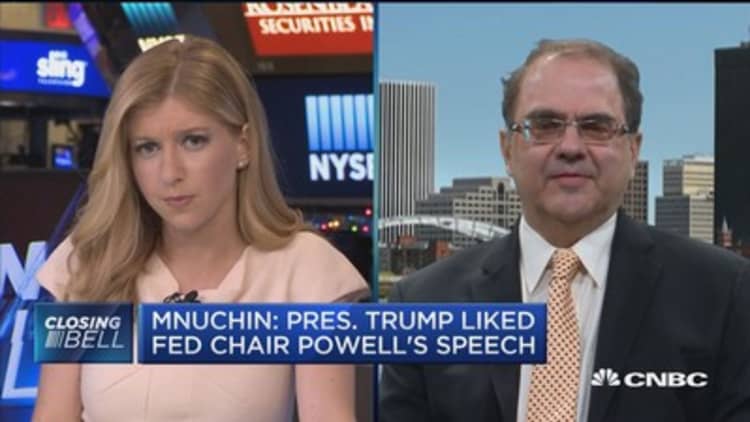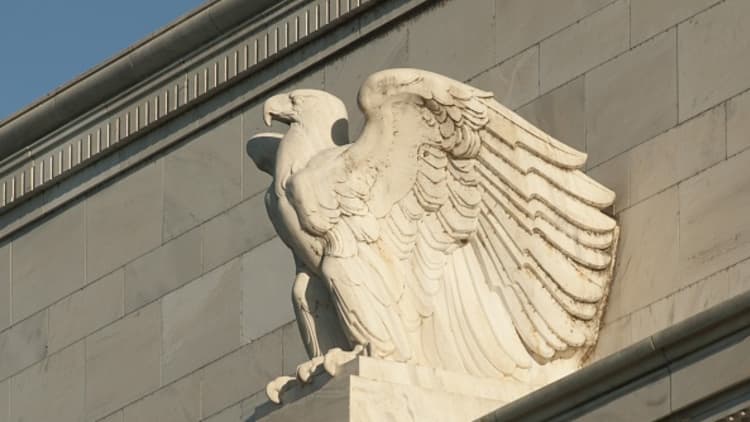President Donald Trump has made one last pitch to pressure the Federal Reserve into not raising interest rates next week, but it's expected to have little impact.
Despite a string of events that has seemed to push the central bank into a more dovish posture, a December hike now seems inevitable.
The market is pricing in a quarter-point increase and Fed officials have done little to dissuade that position, so Trump's protests again are unlikely to influence Chairman Jerome Powell and the rest of the Federal Open Market Committee.

Powell "has a clear path from the marketplace to raise 25 basis points. There's no reason for him not to," said Steve Blitz, chief U.S. economist at TS Lombard. "Given all the noise from Trump, it would probably do his credibility and the Fed's credibility more harm if they skipped December."
Still, the president gave it one last shot.
For months, Trump has been blasting the Fed for the series of rate hikes it has undertaken since December 2015. The FOMC has raised its benchmark overnight rate six times since Trump has been in office, including three increases after Powell took over as chair in February 2018.
This time around, the president took a little softer approach. In an interview with Reuters, Trump called Powell "a good man" who is "trying to do what he thinks is best." That's a contrast to recent statements he has made implying he regrets naming Powell to succeed Janet Yellen, who was the first one-term Fed chair since the late 1970s.
But he repeated his assertion that he needs "accommodation" as he engages in a pitched trade battle with China. Most economists also are expecting the economy to cool off a bit next year after a 2018 that saw the highest growth since the Great Recession ended in mid-2009.
Powell, though, is likely to shepherd another increase through and provide some clues about the direction of policy in 2019.
'He's a markets guy'
"I think he's absolutely the right guy at the right time. I really do believe that. Time will tell, obviously, but I'm a big fan," Blitz said. "The reason I'm a big fan is because he's a markets guy and I think the failure of (previous Fed Chairman Ben) Bernanke and Yellen was that they weren't markets people. They really didn't understand how markets work. They approached it as an economic professor would, as an academic would, and they made some critical errors."
Indeed, markets are giving Powell a clear path to next week's hike.
Fed funds futures contracts imply a rate of 2.27 percent to end the year, which the CME calculates as an 80 percent chance of another increase. The rate currently is in a target range of 2 percent to 2.25 percent. Traders, though, are pricing in just one more hike next year, and even that move has just a 58 percent chance of happening.
The market "is not telling you that this next hike is a bad hike," Blitz said. "What they're telling you is you have to ease back on your forward expectations that you're driving into the marketplace."
Powell will have a chance to explain the Fed's mindset at a news conference that follows the Dec. 18-19 meeting. Individual members also will be able to update their forecasts via the "dot plot" that shows their estimates of where the funds rate is expected to go for the next few years. They also will give their outlooks on GDP, inflation and unemployment through the summary of economic projections.
Markets are expecting Powell to indicate the Fed will be data dependent — as opposed to a preset course — with policy, and that even could include a signal that the Fed might pause after its next hike.
"The imperative is he has to make it a hike that doesn't express concern that the economy is weakening," Blitz said. "He needs to convey that it's a stop at a plateau as opposed to a stop because we're concerned about the economy slowing and we might have to start to ease. The Fed chairman never wants to come out and say, 'I'm worried.'"



